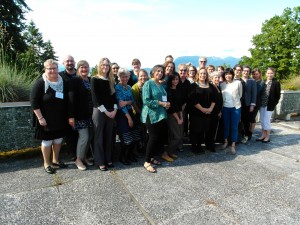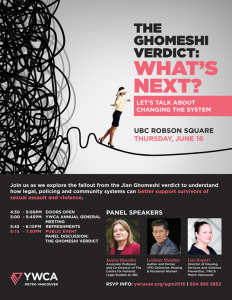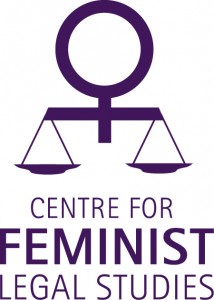A Report on the recent conference at the University of British Columbia, May 26 -27 2014
On May 26–27, 2014, feminist and pro-feminist scholars in multiple disciplines from Canada, the United States, Australia, New Zealand, Israel, the United Kingdom, Poland, Sweden, and Taiwan gathered at UBC’s Peter Wall Institute, to participate in a workshop titled “Men’s Groups: Challenging Feminism”. The workshop was organized by Susan Boyd, Professor of Law and Chair in Feminist Legal Studies at the UBC Faculty of Law, and was generously sponsored by the Peter Wall Institute for Advanced Studies, the Faculty of Law at Allard Hall, the Centre for Feminist Legal Studies, and the Canadian Journal of Women and the Law.

The conference delegates enjoying the sunshine and view
The objective of the workshop was to explore a key source of resistance to feminism: organizations acting in the name of men’s and fathers’ rights and interests, which argue that men are discriminated against in relation to law (especially family law), education, and government funding. Another objective was to provide an opportunity for self-examination, update, and creativity in order to support the advancement of feminist theories and strategies. Key questions explored included: (a) how men’s group actions in different countries discursively construct feminism, (b) lessons for the feminist movement, nationally and globally, historically and currently, from the growing legitimacy of men’s groups, and (c) how to avoid an oppositional approach to gender in men’s rights and feminist discourses.
The workshop was divided into six panels over two days, along with a keynote speech and a concluding discussion. At the first panel, “Men’s Reaction to the Rise of Feminism”, Francis Dupuis-Déri discussed the historical and contemporary discourse of “crises of masculinity”, and its connection to feminism as a political threat to men’s power. Michael Messner discussed the role of both pro-feminist and anti-feminist men’s groups in moments of historical gender formation, suggesting concern over how the participation of male feminist allies may mix with the reduced radical potential of feminism flowing from its institutionalization and professionalization. Finally, Michael Salter commented on how the traditional concerns of men’s rights activists have been rearticulated using the language of men’s health needs, and how this has moved anti-feminist discourse from the fringes to the political centre. At the second panel, “Global Perspectives”, Marsha Freeman and Ruth Halperin-Kaddari discussed the feminist potential of the UN Convention on the Elimination of All Forms of Discrimination Against Women (CEDAW), looking at the use of international law processes by both women’s and men’s groups. Marilou McPhedran and Susan Bazilli then examined how alliances between women’s and men’s groups may actually undercut gender equality. At the third panel, “Men’s Groups in Context”, Chao-ju Chen considered why there was no formal men’s rights movement in Taiwan. Katarzyna Wojnicka then looked at several different men’s organizations that reflect the mainstreaming of gender inequality and anti-feminism in Poland. In the keynote public lecture at the close of the first day, “Martyrs of Marriage?: Men’s Rights Activists, Law, and Feminism”, Srimati Basu spoke about her Fulbright research on the men’s rights social movement in India.
On the second day, at the panel “Men’s Groups and Violence Against Women”, Lise Gotell started by discussing the ways in which men’s groups have challenged and attacked anti-rape activism. Monica Burman then examined anti-feminist discourse in Sweden, suggesting ways of understanding Swedish conceptions of men, gender equality, and feminism. Finally, Elizabeth Sheehy discussed defending battered women in public spaces, both looking at the challenges of doing so and making suggestions on how to better use the mainstream media to support feminist goals. At the following panel, “Family and Children”, Molly Dragiewicz considered the prevalence of family studies literature conflating post-separation joint or shared custody with the best interests of the child, the absence of family studies literature that takes domestic violence into account, and the need for greater integration of cross-discipline research. Next, Ana Jordan presented a typology to help situate anti-feminist and post-feminist movements, and suggested that in addition to openly hostile anti-feminist activism, ambivalent post-feminist discourse should also be a cause for concern. Finally, Vivienne Elizabeth outlined how separated fathers have been presented in the New Zealand media. At the final panel, “Silencing Strategies”, Ruth Mann discussed how the dismantling of Status of Women Canada and the Family Violence Initiative demonstrates the synergy between anti-feminist backlash and the “new right” neoliberal agenda. Next, Maria Edstrom spoke about Nordic experiences of sexualized hate speech post-Behring Breivik. Finally, Daphna Hacker looked at how divorced Israeli men have used international and transnational legal processes as a part of their anti-feminist strategy.
Several key themes and insights emerged from the presentations and open-floor discussions. The first is that the form of organized resistance to feminism has shifted, at least in North America. Earlier resistance took the form of fathers’ rights groups, which suggested that family law had pandered to women’s interests and was biased against men. More recently, feminist work on violence against women and sexual assault/rape has been challenged by men’s groups. In some cases, this has taken the form of vitriolic attacks on feminist scholars via the media and online. Other anti-feminist resisters have framed themselves as the “true” defenders of equality, using a focus on men’s rights to balance out the supposedly unfair amount of resources and attention dedicated to women’s rights.
A second key insight is that, although there are many similarities internationally in the strategies of men’s activists and the experiences of feminists, the form of resistance to feminist activism varies significantly from country to country, jurisdiction to jurisdiction. As for similarities, fathers’ rights lobbying for shared parenting and their criticism of feminists who suggest limits on such a norm (e.g. in cases of domestic abuse) is common to many jurisdictions. Perhaps most notably in terms of differences, Taiwan has not witnessed an organized men’s movement to date, whereas anti-feminism is part of the mainstream political and cultural discourse in Poland.
A third important insight is that conservative men’s rights activists have recently invoked the language of men’s “health” and men’s “needs” to promote their platform, to some extent leaving the language of men’s “rights” behind.
A fourth insight is that funding cuts to non-profit organizations around the world affect the nature of, and relationships between, feminist and pro-feminist organizations. For instance, it is more likely now that a women’s-rights-oriented non-profit group is led by a good fundraiser rather than a feminist political organizer. Moreover, in a context where various organizations are competing for scarce funding, men’s groups that identify as pro-feminist and that engage in anti-violence work may actually inhibit front-line service-oriented women’s organizations if they are awarded the limited available funds instead of women’s groups.
Innovative approaches to dealing with the media when discussing issues such as violence against women were brainstormed, as well as ways in which feminist academics can translate their scholarly work into more accessible formats for the general public. There was also discussion regarding what kinds of new research feminist family lawyers would find useful to their work. For example, feminist lawyers working in the area of child custody stressed the importance of concrete data references regarding the prevalence of domestic abuse and its impact on custody. Finally, the conference emphasized collaborative, interdisciplinary work, a method of scholarship that has been underdeveloped in the field of law.
The presentations elicited vibrant, interdisciplinary conversation about the nature and impact of men’s rights activism, particularly in relation to its impact on feminism. At least two special issues of refereed journals will emerge from the research presented. The workshop opened the door to collaborative work across disciplines, and an international research group studying Anti-Feminist Movements has been established to facilitate the sharing of research and future collaboration.




